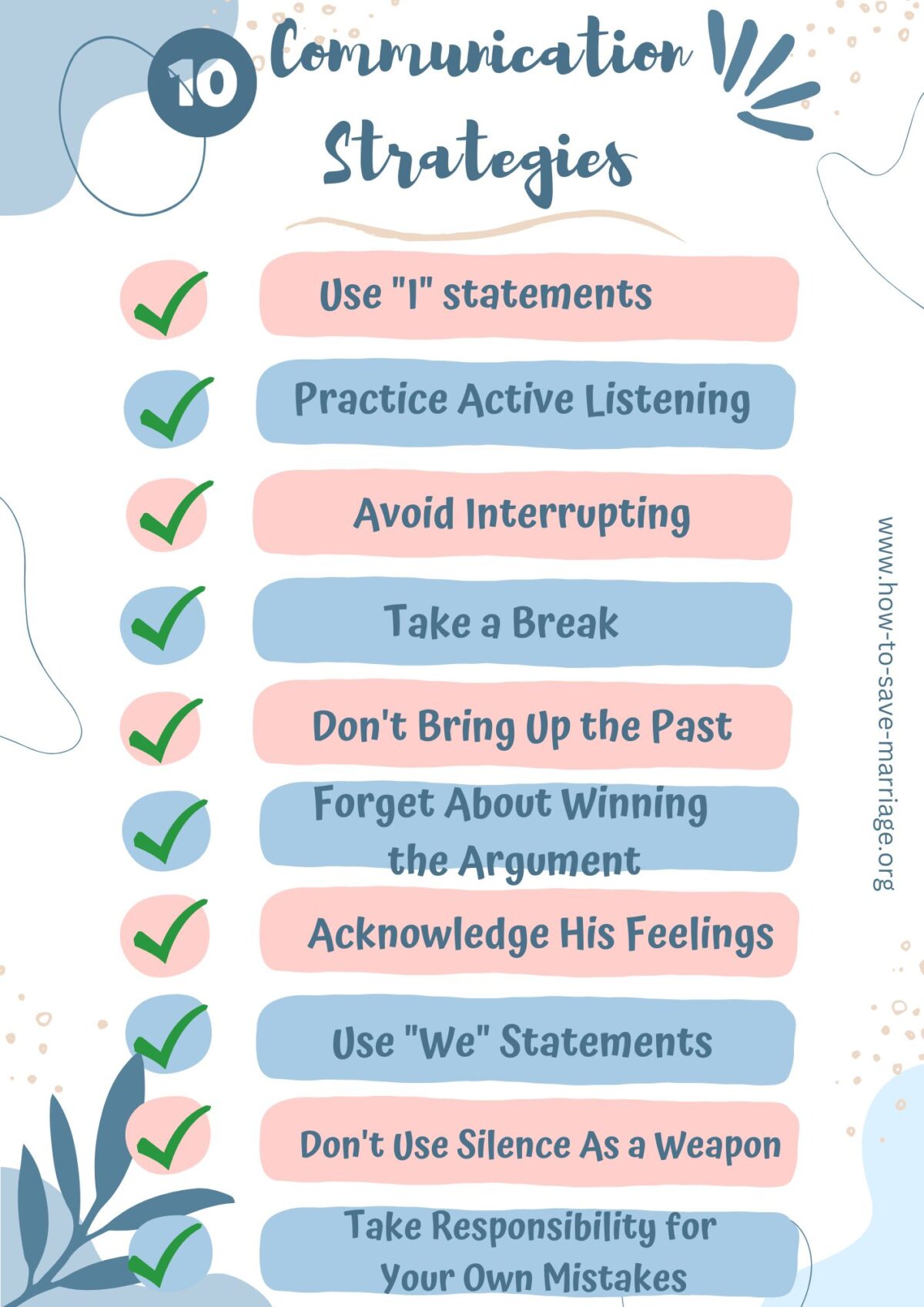
Many researchers have concluded that most marital conflicts and differences are completely reconcilable.
But here’s the thing – when couples disagree, arguments often become filled with criticism and unspoken expectations. Instead of looking at our own expectations and making changes, we tend to put the blame on our partner and expect them to change.
This will always result in frustration and disappointment.
Learning how to communicate is the key to resolving any conflict in a marriage.
in a recent study, researchers surveyed over a thousand people and found that communication was the most common source of conflict for all couples – even more than household chores, finances, sex, and problematic partner habits.
If you implement the 10 conflict-resolving strategies you’ll find here, you’ll finally start to understand each other better, reduce the stress in your relationship, and enjoy stronger connection, trust, and intimacy.
10 Communication Strategies to End Your Marriage Conflicts
First, here’s the cheat sheet – below you’ll find explanations and examples for each strategy.
1. Use “I” statements
Use “I” statements to express how you feel, rather than placing blame on your partner. Starting a sentence with “I feel” instead of “you did” can shift the focus to your own feelings rather than pointing fingers.
For example: “You forgot our anniversary and it makes me feel invisible”, instead of “You forgot our anniversary and ruined my life.”
According to studies, this strategy helps you avoid making accusations or sounding judgmental, which can put your husband on the defensive, and spiral into hostile communication.
2. Practice Active Listening
Make sure to fully understand your partner’s perspective before responding. Listen to your partner without interrupting, and repeat what you heard to ensure you understand.
For example, “So what you’re saying is, you want to paint the entire house neon green?”
Active listening helps your husband feel heard and understood, which can build trust, deepen emotional intimacy, and encourages him to continue talking.
3. Avoid Interrupting
Let your partner finish their thoughts before responding. Interrupting can be seen as dismissive and disrespectful, so let your partner finish what they’re saying before responding.
When you interrupt him, here’s what he hears: “Hold that thought, I’m just going to jump in and tell you you’re wrong.”
This can derail a conversation and prevent both of you from understanding each other’s perspective.
4. Take a Break
If emotions are running high, take a break and come back to the conversation when you’re both calm and collected.
Emotions can escalate quickly in conflict, so taking a break can help you both calm down and approach the conversation with a clear head.
Here’s what I said to my husband the other day when I sensed that we were getting hostile: “I’m going to take a breather and imagine you’re a giant stuffed teddy bear instead of an annoying human being.”
Taking a break is important because when we’re emotionally charged, our thinking can become distorted and we might say things we don’t mean, and regret. These things can also be used against us as the fight continues (and in years to come).
5. Don’t Bring Up the Past
This is one of the trickiest strategies and probably the most difficult one: stay focused on the present issue at hand, rather than bringing up past grievances. Bringing up past issues can derail the conversation into a dead end. It makes things feel hopeless.
When you bring up the past, rest assured that he will bring up the past as well. From here it can only go downhill and escalate to mutual, endless accusations.
The point is to avoid patterns made in the past. Don’t let the past endlessly repeat itself and prevent you from starting a new, positive pattern, right now.
6. Acknowledge Your Partner’s Feelings
Sometimes, it’s hard to see things from your partner’s perspective, but acknowledging their feelings can help them feel heard and validated. This can help prevent conflicts from escalating and allow for more productive communication.
For example, even if my husband thinks pineapple belongs on pizza (which is obviously a crime against nature), I acknowledge his feelings and try to understand he might enjoy it.
Validation of his emotional experience is key to conflict resolution. When a person feels validated, they are more likely to be open to discussion, compromise, and resolution.
7. Use “We” Statements
By using “we” instead of “I” or “You” – you emphasize that you’re in this together, rather than on opposing sides.
Using “we” statements can help shift the focus from blame and finger-pointing to a shared goal of resolving the conflict. It can also help reinforce the idea that you and your partner are a team.
For example, instead of saying ‘You’re always forgetting to take out the trash,’ try saying ‘We need to remember to take out the trash more often, so our house doesn’t smell like a dumpster fire.’
8. Don’t Use Silence As a Weapon
While it may be tempting to give your partner the silent treatment during a fight, it can actually be counterproductive.
Communication is key to resolving conflicts, and withholding it can create more tension.
Silence can be a powerful tool, but it’s not productive when used manipulative as a punishment or a weapon. If your partner uses it against you – here’s how to handle the silent treatment with dignity.
9. Take Responsibility for Your Own Mistakes
It’s important to take ownership of your actions and admit when you’re wrong. Apologizing can help show your partner that you’re willing to make amends and can help de-escalate conflicts.
Apologizing can help repair damaged relationships and restore trust. Also, if you apologize for your own mistakes, it’s likely that your partner will be inspired to apologize for his mistakes as well.
I grew up in a household with a somewhat dysfunctional marriage, with both of my parents constantly blaming each other for their problems. I swore to myself that I would have a similar relationship. Years passed by and after having 2 children with my husband I found myself doing the same thing my parents did. Whether I told him or not, inside I blamed him for everything going wrong in our relationship.
After being shocked by this discovery (it just dawned on me one day) I immediately developed a habit of asking myself whether I am doing the same things I accuse him of doing. To my surprise, I found out that I did. Almost everything I accused him of – reflected back to me like a mirror.
This is when the real inner work has begun. At least for me. It has changed everything.
10. Forget About Winning the Argument
Focus on finding a solution that will benefit both of you, rather than “winning” the argument.
It can be easy to get caught up in the idea of “winning” an argument. We have done that since we were children.
Deep down there’s a scared child that thinks that if he won’t win, he will not survive.
What’s the point of winning when deep down you know that his resentment continues and that everything bottled inside of him will erupt the next time you disagree?
When you’re in an argument, try to put yourself in his shoes and see things from his perspective. Then, work together to find a solution that makes both of you happy.
Remember, there are no winners in a marital argument – only losers and people sleeping on the couch.
What Are the Most Common Conflicts in a Marriage?
Conflict is a normal part of every couple’s relationship and shouldn’t be seen as a negative thing.
Studies have shown that trust, jealousy, partner personality traits, habits, and sex (including infidelity) are the most common triggers for conflicts between partners. This was found true for all cultures and contexts.
Most couples tend to argue about the same things, but the quality of the relationship is more determined by how they manage these conflicts rather than the specific issues they fight over.
What Are The Habits That Trigger Relationship Conflicts?
According to couple surveys, the most conflict-triggering habits are being condescending, possessive (jealous and dependant), neglecting (does your husband ignore you?), abusive, and unfaithful.
The 7 Steps to Fixing Your Marriage
End the constant fights with your partner and reignite love in your life with Mort Fertel’s (the creator of “Marriage Fitness) Free email series – “The 7 Steps to Fixing Your Marriage“.
Every relationship has its rough patches, but this free email series can guide you through the seven crucial steps, which have helped thousands of couples rekindle their love and strengthen their connection.
Rooting for ya,
Lisa
Studies
Meyer, D., & Sledge, R. (2022). The Relationship Between Conflict Topics and Romantic Relationship Dynamics. Journal of Family Issues, 43(2), 306–323.
Rogers SL, Howieson J, Neame C. I understand you feel that way, but I feel this way: the benefits of I-language and communicating perspective during conflict. PeerJ. 2018 May 18;6:e4831. PMID: 29796350; PMCID: PMC5961625.
Dillon, L. M., Nowak, N., Weisfeld, G. E., Weisfeld, C. C., Shattuck, K. S., Imamoğlu, O. E., Butovskaya, M., & Shen, J. (2015). Sources of marital conflict in five cultures. Evolutionary Psychology, 13(1), 1–15.
Buss, D. M. (1989). Conflict between the sexes: Strategic interference and the evocation of anger and upset. Journal of Personality and Social Psychology, 56(5), 735–747.

